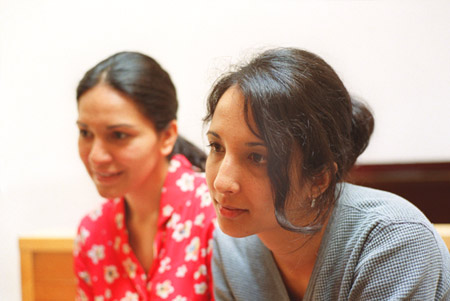KSG graduates help Kenyans battle AIDS
‘Robust and useful’ project suggests reforms for leading AIDS-fighting organization

Shanti Nayak and Nazanin Samari-Kermani have made the Kenyan battle against AIDS a personal matter, traveling this semester from Mount Elgon in Kenya’s west to the Indian Ocean port of Mombasa in the east to help a leading anti-poverty organization gear up to fight the disease.
The two masters in public policy students, who are graduating from the Kennedy School of Government, undertook the study as their Policy Analysis Exercise, designed to serve as the final project for second-year M.P.P. students.
The work, with ActionAid-Kenya, a United Kingdom-based anti-poverty organization, identified a variety of reforms that should help ActionAid more efficiently battle the disease, which kills 700 people a day in the East African nation.
Though the report contains several suggestions for improvement, both Samari-Kermani and Nayak said it shouldn’t be viewed as a negative reflection on the organization. In fact, they said, ActionAid is courageous to take on such a large task, stepping into the vacuum left by government inaction.
“This is not a story about an organization failing to do its job. It’s a story about an organization we identified as one of the most promising to take on this issue,” said Nayak, who grew up in Vermont and got her bachelor’s degree from Smith College. “They stepped in to fill the void, but this work is not like building a well, or delivering prenatal care, or building a school. Our message to them is HIV AIDS is not like anything you’re currently doing.”
The two suggest designing AIDS training for front-line staff, who, they said, often believe in the stereotypes surrounding the disease and feel hopeless about their ability to help. They suggested revamping community education curricula with an emphasis on the need for activism, and also suggested more work to identify community-based organizations and improve the coordination of their efforts.
“We were helping ActionAid identify strengths and weaknesses,” said Samari-Kermani, who grew up in California and got her bachelor’s degree from Bryn Mawr College. “People from [Kenyan] communities are staff members, and they carry the same fear, worry, and anxiety [as others in the communities]. It’s difficult for them to talk about sexuality and sexual issues. ActionAid needs to recognize that and make an extra effort.”
Samari-Kermani compared attitudes in Kenya to those in the United States in the early stages of the AIDS epidemic here, with people fearful of the disease and believing common stereotypes, for example, that only the promiscuous contract the illness.
In addition, with few health facilities and little anti-AIDS medicine available, many in Kenya view the disease as a death sentence. In the face of that hopelessness, Samari-Kermani and Nayak said, there is resistance to even getting tested, an important first step in fighting the disease.
“Getting tested means taking an enormous risk to your family, to your children, to your job,” Nayak said. “People are deathly afraid of this disease.”
The seeds of the project were sown last spring, during the project required of all first-year M.P.P. students. Kennedy School Adjunct Lecturer Amir Attaran, who leads the seminar for international development students, invited ActionAid-Kenya’s National AIDS Coordinator Chris Ouma to talk to the students as part of the project.
Attaran said Nayak and Samari-Kermani were motivated from the beginning, picking the project themselves. He said the resulting report contained “robust and useful” suggestions and is being considered for a Kennedy School award for the best policy analysis of the year.
Samari-Kermani and Nayak, who both had an interest in working on AIDS, approached Ouma during his visit and talked with him about his work. Samari-Kermani traveled to Kenya last summer and looked at youth programs and voluntary testing programs. She also spent a week in Uganda, which is often held up as having a model anti-AIDS effort, to see how an effective program works.
The groundwork laid, both students traveled to Kenya in January to do the bulk of the project’s work. Ouma liked the report enough to invite Samari-Kermani to return to Kenya after graduation and stay for a year, working to implement the recommendations. After graduation, Nayak plans to work in New York City with a management consulting firm.
The two said the message for Americans to take from their work is that, despite the dismal picture painted of AIDS in Africa, there is hope. People there have been spurred into action, despite a lack of resources, because they understand that the disease is devastating their communities.
“There’s a lot of doom and gloom in the West about this disease in Africa,” Nayak said, “and most of it is justifiable, but we also saw a lot being done on the ground in Kenya, by people with very few resources, to save their communities.”




